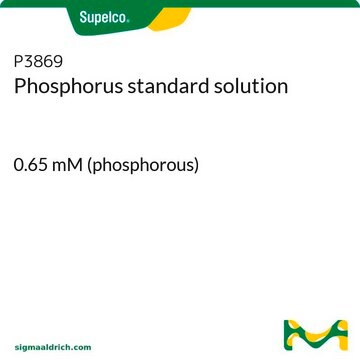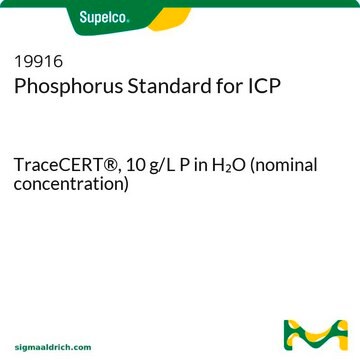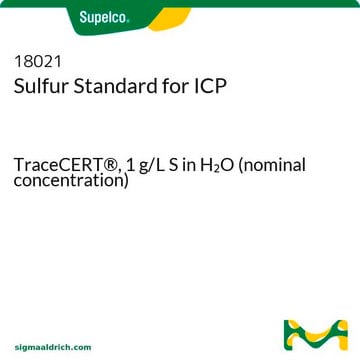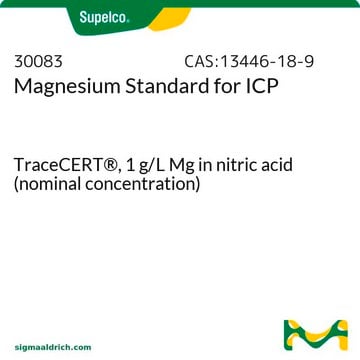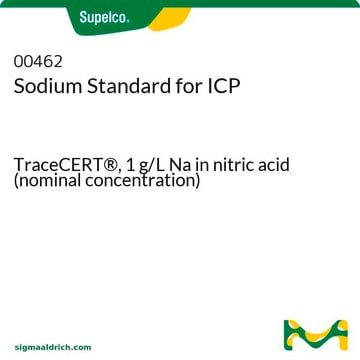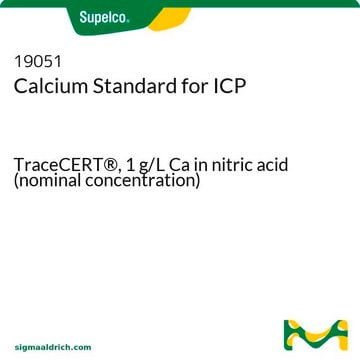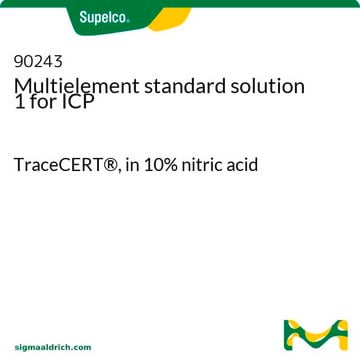1.70340
Phosphorus ICP standard
traceable to SRM from NIST H₃PO₄ in H₂O 1000 mg/l P Certipur®
About This Item
Recommended Products
grade
certified reference material
Quality Level
agency
suitable for EPA 200.7
product line
Certipur®
concentration
1000 mg/L P in H2O
technique(s)
ICP: suitable
pH
1 (20 °C in H2O)
density
1.000 g/cm3 at 20 °C
application(s)
industrial qc
pharmaceutical
format
single component solution
storage temp.
15-25°C
Related Categories
General description
Please visit ISO certificates and Site Quality Self-Assessments to access the current certificates of accreditation.
Download your certificate at http://www.sigma-aldrich.com to view certified values, including uncertainty, date of expiry, and detailed information about trace impurities.
Application
- Estimation of metals and phosphorus in vegetable seeds by ICP-OES and ICP-MS
- Inductively coupled plasma quadrupole-based mass spectrometry (ICP-QMS) based quantification of phosphorus in protein samples
- Development and validation of an inductively coupled plasma -optical emission spectroscopy (ICP-OES) method for the determination of rare earth elements, thorium, yttrium, and phosphorus in monazite samples
- Comparative analysis of inductively coupled plasma-mass spectrometry (ICP-MS) and colorimetry for the determination of total and extractable phosphorus in soils
- Electrochemical measurement of dissolved phosphorus in canal water samples
- Determination of phosphorus and potassium content of commercial inorganic fertilizers by ICP-OES
Legal Information
Storage Class
10 - Combustible liquids
wgk_germany
nwg
Certificates of Analysis (COA)
Search for Certificates of Analysis (COA) by entering the products Lot/Batch Number. Lot and Batch Numbers can be found on a product’s label following the words ‘Lot’ or ‘Batch’.
Already Own This Product?
Find documentation for the products that you have recently purchased in the Document Library.
Customers Also Viewed
Related Content
This page is intended to make it easier to find the consumables you need based on the analytical method you’re using. Methods included on this page come from the EPA, Standard Methods and ASTM.
Our team of scientists has experience in all areas of research including Life Science, Material Science, Chemical Synthesis, Chromatography, Analytical and many others.
Contact Technical Service


